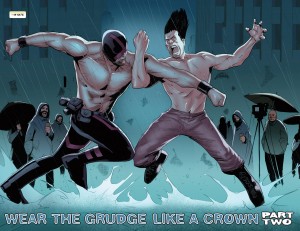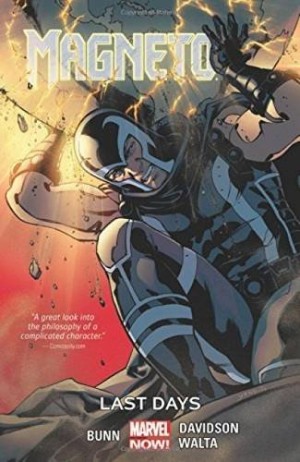Review by Ian Keogh
Legacy is such a frustrating series, incorporating much that’s good, but also much that’s all too convenient, or cheap tricks on the readership. A case in point is the opening tale. It seems at first that Simon Spurrier’s shifted tack to present a more linear tale in Revenants, as the opening narrative captions are those of Pete Wisdom, foul-mouthed mutant director of MI-5, Britain’s security service. Spurrier accentuates the similarities between Wisdom and Kingsman, and jollies everything along nicely until a revelation that’s been used already in the series and is starting to become tiresome. It’s a lazy option when you have a character who can do almost anything via mental manipulation.
Spurrier’s also been weak to date in presenting credible characters. This is, in part, due to the difficulties of dealing with mental illness, although David Haller’s condition is never stated as overtly as that. Mood swings, depression and loss all combine in Haller, who’s only consistent in his inconsistency, and conveying that with a sense of proportion requires a skill not apparent. There are similar problems with Blindfold, who’s inexplicably attracted to Haller. She’s an annoyingly needy type who’ll keep returning no matter how shabbily she’s been previously treated, or what lies she’s been told in service of the greater good as Haller sees it. See the previous Invasive Exotics for details. Spurrier briefly rectifies matters with some emotionally strong pages in the middle chapter during which Haller confronts his mother. For once there’s some honesty, not glib one-liners. It’s raw and it’s good, yet the potential for any continuation is discarded for the sake of random shock lacking any real meaning in terms of the greater plot.
Three artists work on Revenants. Paul Davidson sublimates his natural style to echo that of Tan Eng Huat, the main series artist, and achieves the same fiddlyness about matters, but uses more straightforward visual angles. Koi Pham (sample page) is far simpler and clearer, so a complete contrast even before his disdain for panel borders.
The spur motivating Haller throughout the series is a vision in which he appears to be responsible for annihilating all mutants, so from the start he’s been targeting instances of mutant hate groups and persecution. As the finale reveals, however, Haller has been one step ahead, and whaddaya know it’s yet another deus ex-machina ending. There is a coda, a twist, and that sets up For We Are Many.





